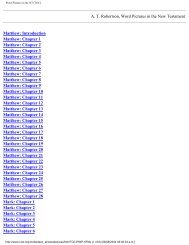Commentary on Joshua - Keil & Delitzsch - David Cox
Commentary on Joshua - Keil & Delitzsch - David Cox
Commentary on Joshua - Keil & Delitzsch - David Cox
You also want an ePaper? Increase the reach of your titles
YUMPU automatically turns print PDFs into web optimized ePapers that Google loves.
<strong>Keil</strong> and <strong>Delitzsch</strong> <str<strong>on</strong>g>Commentary</str<strong>on</strong>g> <strong>on</strong> the Old Testament<br />
<br />
And <strong>Joshua</strong>, and all Israel with him, took Achan the s<strong>on</strong> of Zerah, and the silver,<br />
and the garment, and the wedge of gold, and his s<strong>on</strong>s, and his daughters, and his<br />
oxen, and his asses, and his sheep, and his tent, and all that he had: and they<br />
brought them unto the valley of Achor.<br />
Then <strong>Joshua</strong> and all Israel, i.e., the whole nati<strong>on</strong> in the pers<strong>on</strong> of its heads or<br />
representatives, took Achan, together with the things which he had purloined, and his<br />
s<strong>on</strong>s and daughters, his cattle, and his tent with all its furniture, and brought them into<br />
the valley of Achor, where they st<strong>on</strong>ed them to death and then burned them, after<br />
<strong>Joshua</strong> had <strong>on</strong>ce more pr<strong>on</strong>ounced this sentence up<strong>on</strong> him in the place of judgment:<br />
"How hast thou troubled us" ( `aakar (OT:5916), as in Josh 6:18, to bring into<br />
trouble)! "The Lord will trouble thee this day." It by no means follows from the<br />
expressi<strong>on</strong> "st<strong>on</strong>ed him" in v. 25, that Achan <strong>on</strong>ly was st<strong>on</strong>ed. The singular pr<strong>on</strong>oun<br />
is used to designate Achan al<strong>on</strong>e, as being the principal pers<strong>on</strong> c<strong>on</strong>cerned. But it is<br />
obvious enough that his children and cattle were st<strong>on</strong>ed, from what follows in the<br />
very same verse: "They burned them (the pers<strong>on</strong>s st<strong>on</strong>ed to death, and their things)<br />
with fire, and heaped up st<strong>on</strong>es up<strong>on</strong> them." It is true that in Deut 24:16 the Mosaic<br />
law expressly forbids the putting to death of children for their fathers' sins; and many<br />
have imagined, therefore, that Achan's s<strong>on</strong>s and daughters were simply taken into the<br />
valley to be spectators of the punishment inflicted up<strong>on</strong> the father, that it might be a<br />
warning to them.<br />
But for what reas<strong>on</strong>, then, were Achan's cattle (oxen, sheep, and asses) taken out<br />
al<strong>on</strong>g with him? Certainly for no other purpose than to be st<strong>on</strong>ed at the same time as<br />
he. The law in questi<strong>on</strong> <strong>on</strong>ly referred to the punishment of ordinary criminals, and<br />
therefore was not applicable at all to the present case, in which the punishment was<br />
commanded by the Lord himself. Achan had fallen under the ban by laying hands<br />
up<strong>on</strong> what had been banned, and c<strong>on</strong>sequently was exposed to the same punishment<br />
as a town that had fallen away to idolatry (Deut 13:16-17). The law of the ban was<br />
founded up<strong>on</strong> the assumpti<strong>on</strong>, that the c<strong>on</strong>duct to be punished was not a crime of<br />
which the individual <strong>on</strong>ly was guilty, but <strong>on</strong>e in which the whole family of the<br />
leading sinner, in fact everything c<strong>on</strong>nected with him, participated. Thus, in the case<br />
http://207.44.232.113/~bible/comment/ot/k&d/josh/jos40.html (1 of 2) [13/08/2004 01:17:28 p.m.]
















